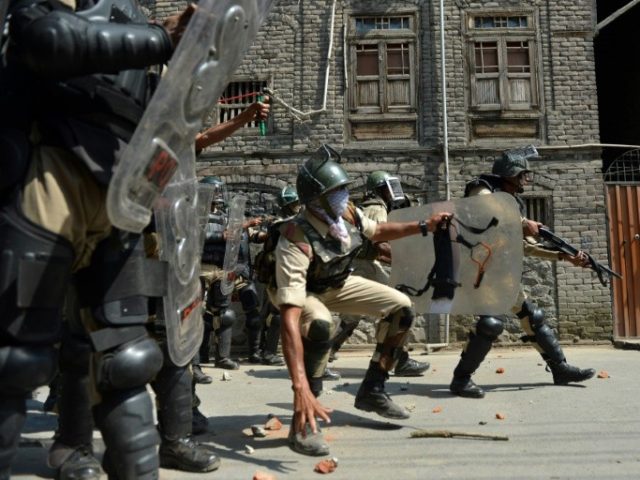The Russian president of the United Nations Security Council (UNSC) has decided to ignore the intensifying tensions between nuclear-armed rivals India and Pakistan in the Muslim-majority and disputed Himalayan region of Kashmir.
Ambassador Vitaly Churkin, permanent representative of the Russian Federation to the UN and president of the UNSC for the month of October, told reporters on Monday that the Council “is not discussing the issues between India and Pakistan and has no plans to do so,” reports The Hindu.
“I don’t want to go there. No one wants to go there,” declared Churkin during a news conference at the UN headquarters, interrupting a reporter who attempted to raise the issue.
“Because I am president of the Security Council. The SC has not been discussing it,” replied the Russian ambassador when the reporter asked why.
When pressed again by the reporter, Churkin ended the exchange, saying, “No comment.”
A day after the Council’s president shared his stance on the India-Pakistan issue with reporters, a spokesperson for the Office of the UN High Commissioner for Human Rights (OHCHR) said Zeid Ra’ad Al Hussein, the commissioner, “is seriously concerned about the human rights situation in Indian-administered Jammu and Kashmir, as well as the rising tensions between India and Pakistan.”
India and Pakistan are reportedly trying to defuse the rising tensions.
In the last week, Pakistani and Indian troops have exchanged fire at least twice across the Line of Control (LoC), in violation of the 2003 Kashmir ceasefire between the two nations.
The LoC refers to a heavily militarized and mountainous frontier that divides the sections of Kashmir controlled by each country.
On Tuesday, the day after the most recent confrontation along the LoC between the two countries, the UN human rights office expressed concern about the growing tension between India and Pakistan in Kashmir.
Rupert Colville, a spokesman for the OHCHR, told reporters:
We urge India and Pakistan to engage in a dialogue and to de-escalate the situation. The inflammatory remarks on both sides only fuel the tensions and could result in a further deterioration of the human rights situation.
We reiterate our call for unfettered and unconditional access to both Indian-administered Jammu and Kashmir and Pakistan-administered Kashmir to enable us to independently and impartially monitor the human rights situation. We stand ready to support efforts to de-escalate the situation.
Pakistan, India, and China all have competing claims to Kashmir, but Beijing, which maintains a relationship with the two other countries, has remained in the shadows during recent territorial disputes.
Tensions between India and Pakistan escalated after India accused Pakistan of backing militants who carried out an attack in Indian-held Kashmir on Sept. 18 that killed at least 18 Indian soldiers.
In retaliation, India launched “surgical strikes” against four camps in Pakistan-held Kashmir, allegedly killing 38 terrorists.
Pakistan maintains there were no strikes. It claims that Indian troops used small arms and mortars to explicitly target Pakistani military personnel, killing two soldiers and wounding nine others.
The killing of Burhan Wani, commander of the Kashmir-based terrorist group Hizb-ul-Mujahideen, by Indian troops in July has also fueled the strained relationship between India and Pakistan.
Both countries accuse one another of provocations in Kashmir. India says Pakistan has been arming and training militants in Indian-held Kashmir fighting for independence from India or in favor of a merger with Pakistan, a charge that Islamabad denies.
Pakistan has also been linked to terrorist groups operating in Kashmir, namely Hizb-ul-Mujahideen.
Meanwhile, Pakistan has accused India of cracking down on dissent in India-held Kashmir.
The Hindu reports:
Pakistan has been trying to ensure U.N. involvement in the situation. Pakistan Premier Nawaz Sharif had raised the issue of “human rights violations by India” in Jammu and Kashmir in the General Assembly, but no other country has mentioned it.
After India’s military action in across the LoC, Pakistan’s Permanent Representative to the U.N. Maleeha Lodhi met Secretary General Ban Ki-moon and asked the world body to “intervene boldly and unequivocally” against “aggressive actions and provocations,” by India.
The Muslim-majority of Indian-held Kashmir reportedly favors independence.
“Most people in the Indian-controlled portion favor independence or a merger with Pakistan,” recently reported CBS News. “A militant uprising and subsequent [Indian] army crackdown since 1989 have killed more than 68,000 people.”
The UN, which maintains an institutional presence in the contested area between India and Pakistan, acknowledges that “recent developments, particularly reported ceasefire violations along the Line of Control (LoC), have led to an escalation of tensions between India and Pakistan.”

COMMENTS
Please let us know if you're having issues with commenting.